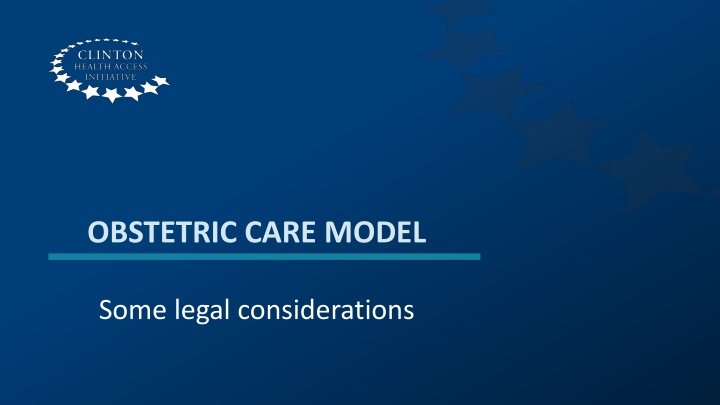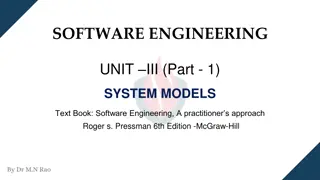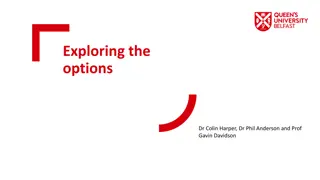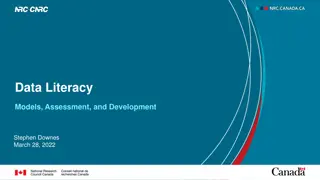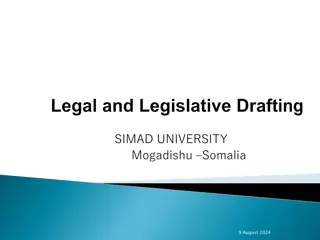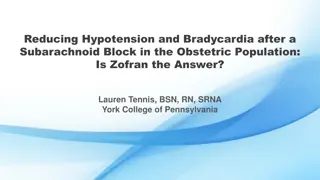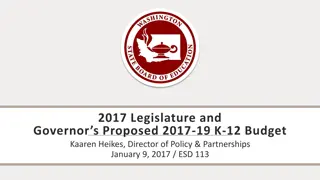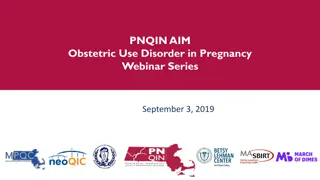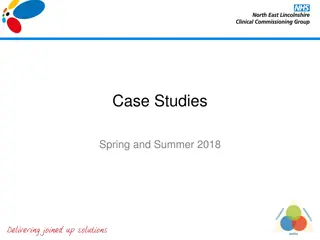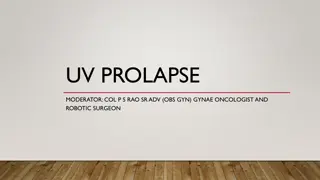Legal Considerations and Legislative Frameworks in Obstetric Care Models
Relevant legal considerations and legislative frameworks play a crucial role in shaping obstetric care models. From the National Health Act to amendments in ethical rules, various regulations impact the implementation and development of healthcare services in South Africa.
Download Presentation

Please find below an Image/Link to download the presentation.
The content on the website is provided AS IS for your information and personal use only. It may not be sold, licensed, or shared on other websites without obtaining consent from the author.If you encounter any issues during the download, it is possible that the publisher has removed the file from their server.
You are allowed to download the files provided on this website for personal or commercial use, subject to the condition that they are used lawfully. All files are the property of their respective owners.
The content on the website is provided AS IS for your information and personal use only. It may not be sold, licensed, or shared on other websites without obtaining consent from the author.
E N D
Presentation Transcript
OBSTETRIC CARE MODEL Some legal considerations
Relevant Legislative Frameworks Depending on the type of service model, the following pieces of legislation is critical: National Health Act; NHI White Paper NHI Act HPCSA CMS R158 There are elements of the discussion with dealt modality of payment and payment levels itself which is not discussed, deliberately, to avoid conflict with the competition legislation
Policy Framework Paragraph 291 of the White Paper on NHI states, There will be a gradual phasing in of the provider payment mechanisms over the implementation period of NHI. Once routine and reliable data becomes more readily available on the diagnoses of patients and services provided, additional steps will include refining the risk- adjusted capitation formula that is used to determine the global budget for each clinic and contracted multidisciplinary group practices. This would particularly relate to taking account of the epidemiological profile of the catchment population.
Perspective from the Medical Schemes Sector The CMS in its annual (CMS Annual Report 2022/23), stated that: The CMS adopted a strategic approach to enhance quality and reduce healthcare costs in the sector Its focus lies in delivering exceptional value for money, championing alternative reimbursement models and fostering contractual arrangements that yield superior health outcomes The Health Market Inquiry (HMI) The final recommendations of the HMI concluded that ... a greater uptake of alternative reimbursement models will allow for beneficial patient outcomes ... (Competition Commission South Africa, 2019) Poonam Doolabh, Lubalethu Dube and Barry Childs in their paper presented at the Actuarial Society of South Africa s 2021 Virtual Convention, stated: Well-designed ARMs can better align the interests of funders and providers of care. In particular, Ransom et al. (1996) found that the number of surgical procedures that were performed during the implementation of the capitation reimbursement model decreased by 15%. (*) 4 * https://www.actuarialsociety.org.za/convention/wp-content/uploads/2021/09/2021-ASSA-DoolabhDubeChilds-FIN.pdf
Amendments to the HPCSA Ethical Rules of Conduct The ethical rules of the Health Professions Council of South Africa (HPCSA) is most commonly cited as the reason hindering innovation in models of care and the development of alternative reimbursement models of care. Amendments to the Health Professions Council of South Africa (HPCSA) Ethical Rules of Conduct published on 17 November 2023 are likely to have a significant impact on the practice of medicine in South Africa. 5 https://www.gov.za/sites/default/files/gcis_document/202311/49720bn510.pdf
Amendments to the HPCSA Ethical Rules of Conduct The amended Ethical Rules of Conduct contemplate the following new concepts: Multidisciplinary healthcare meaning healthcare delivery that involves multiple health practitioners from different professions of healthcare. The health practitioners often work as a team to provide wholesome healthcare services for the benefit of the patient . Quality healthcare services meaning the delivery of health care that is effective, safe and people centred, aimed at achieving desirable outcomes using evidence-based healthcare services to all who could benefit. Appropriate healthcare meaning healthcare delivery which is expected to deliver clinical benefits of care that outweigh the expected negative effects to such an extent that the treatment is justified. Collaborative practices meaning the practices that occurs when multiple health practitioners, from different professional backgrounds, work together with patients, families, carers and communities to deliver the highest quality of care across settings. 6
Fees and commissions Ethical Rule 7 dealing with Fees and Commissions provides at sub-rules (4) and (5) that: (4) A practitioner shall not share fees with any person or with another practitioner who has not taken a commensurate part in the services for which such fees are charged. to this, the following has been added: (6) Notwithstanding anything contained in sub-rules (4) and (5) above, a practitioner may share, charge or receive fees from another practitioner: Provided that in such an instance, there is an express agreement, arrangement or model of rendering multi-disciplinary based health-care services to patients which is structured, which provides high quality health-care services or products, contain costs of rendering health-care services, and enhance access to appropriate healthcare (our emphasis). 7
Partnerships Ethical Rule 8 dealing with Partnership and Juristic Persons originally prohibited practitioners of different specialities from practising in partnership, association or as a juristic person. This prohibition has been watered down by the addition of the following Sub-Rule: (5) Notwithstanding anything contained in this rule, a practitioner may provide health-care services with other registered practitioners, persons registered in terms of the Act, or in terms of any other legislation regulating health professions: Provided that the primary aim will be to enhance the quality of health-care services to patients, and further that there is an express agreement, arrangement or model of rendering multi-disciplinary based health-care services to patientswhich provides high quality health-care services or products to patients, structured to contain costs, and enhance access to appropriate healthcare. (our emphasis) 8
Employment contracts In terms of employment contracts, dealt with at Rule 18, it is now required that the Practitioner ensure that: the employment contract has as its primary aim the enhancement of the quality of health-care services to patients, is structured to contain costs, enhance access to appropriate, high quality health-care services or products to patients, and is not designed to extract profit for the benefit of the practitioner or their employer to the detriment of patients . Under Rule 18 applications the HPCSA has granted approval for hospitals to employ certain types of professionals including Medical Practitioners for outpatients, Obstetricians and Gynaecologists, Anaesthetists https://www.hpcsa.co.za/Content/upload/professional_practice/business_practice/PRIVATE_INSTITUTIONS_CONSIDERED_BY_COUNCIL_IN_TERMS_OF_BUSINESS_PRACTI CE_POLICY_AND_ETHICAL_RULES_Feb_2023.pdf https://www.hpcsa.co.za/Uploads/professional_practice/ethics/Booklet_2_Generic_Ethical_Rules_with_anexures.pdf 9
PRIMARY HEALTH CARE SERVICE PACKAGE FOR SOUTH AFRICA The NDOH undertook a revision to the PHC Package of care in September 2014. in it it defines types of facilities where services will be provided. Clinic An appropriately permanently equipped facility at which a range of PHC services are provided. It is open at least 8 hours a day at least 4 days per week. Community Day Centre A facility which is not open 24 hours a day, 7 days a week, but at which a broad range of PHC services are provided. It also offers accident and emergency but not midwifery services or surgery under general anaesthesia. Community Health Centre A facility which is open 24 hours a day, 7 days a week, at which a broad range of PHC services are provided. It also offers accident and emergency and midwifery services but not - surgery under general anaesthesia. Specific Services identified at Clinic and CHC level includes: Maternity services according to scope of practice and clinical guideline Antenatal care Family Planning services for women Emergency Care Services All medical, surgical, violence, trauma, gynaecologic, obstetric and psychiatric emergencies (Refer to nearest appropriate facility if there is complication)
Other regulatory issues Whilst the licensing of GP and PHC services is not regulated, when such services extend to specific types of care, additional accreditation is required, e.g. dispensing licenses. R-158 REGULATIONS GOVERNING PRIVATEHOSPITALS AND UNATTACHED OPERATING, THEATRE UNITS no person shall erect, establish, extend, conduct, maintain, manage, control or render any service in a private hospital or an unattached operating-theatre unit or permit or arrange for treatment to be provided therein unless such private hospital or unattached operating-theatre unit or proposed private hospital or unattached operating-theatre unit has been registered in accordance with the provisions of these regulations and the proprietor is in possession of a valid certificate of registration issued to him in respect thereof by the Head of Department. R158 specifies certain building requirements for Hospitals and unattached operating-theatre units, such as Rooms required Furniture and equipment Duties of proprietor Does not specify the number of bed though 11
Some Takeaways and last thoughts The purpose of the discussion today is to solicit inputs, comments and critiques of the proposed model. Conclusions being drawn now will stifle that input as it steers the discussion towards a specific discussion and not free thought. That said, The recent legislative changes are leaning towards a more supportive framework for the model described in the paper 12
